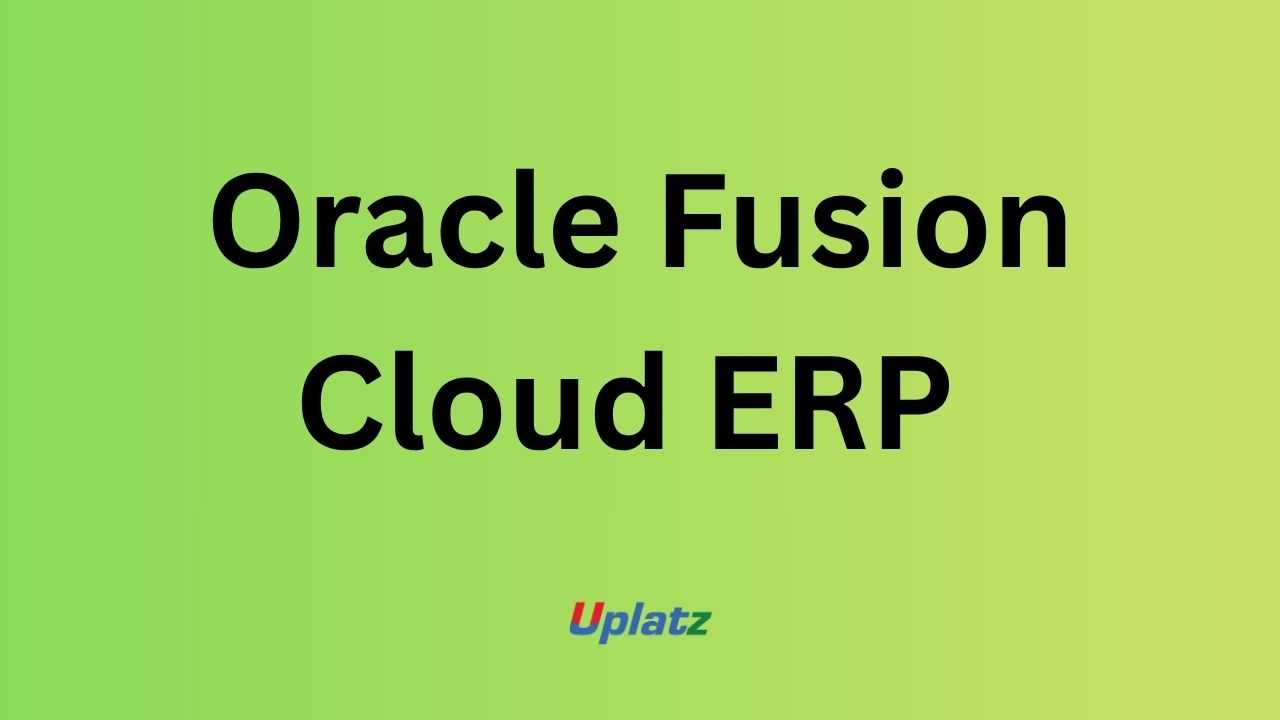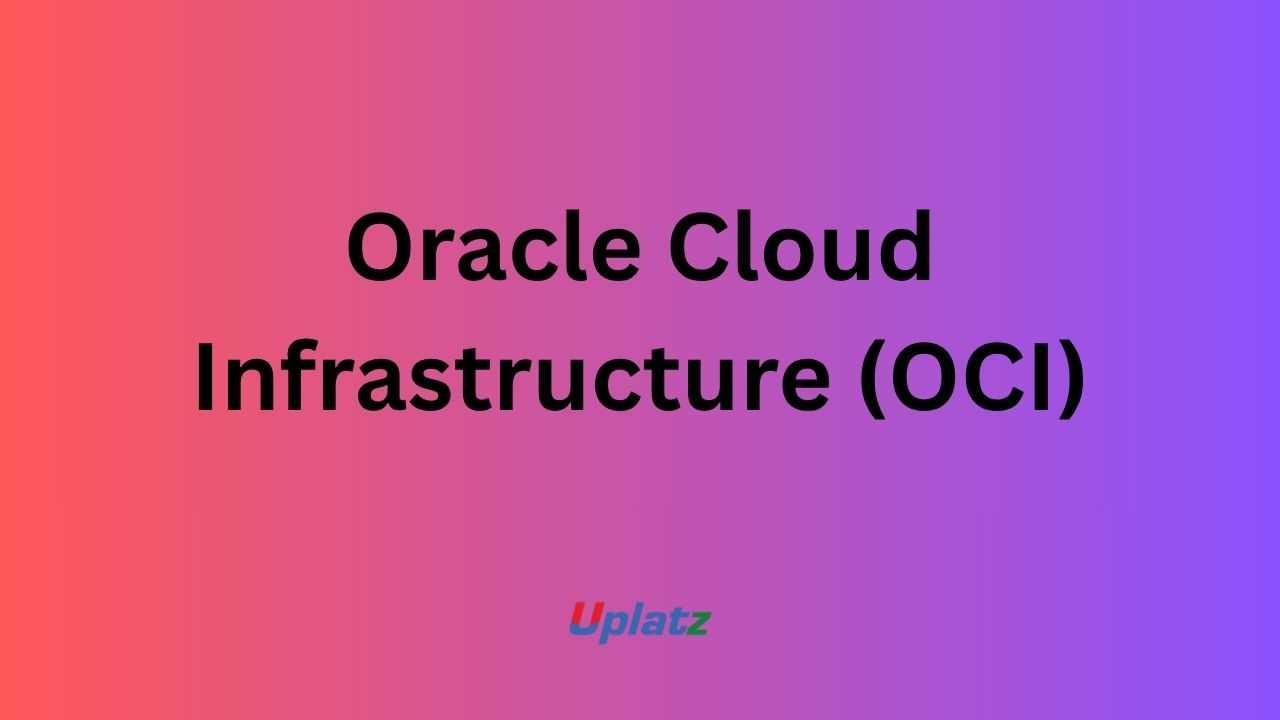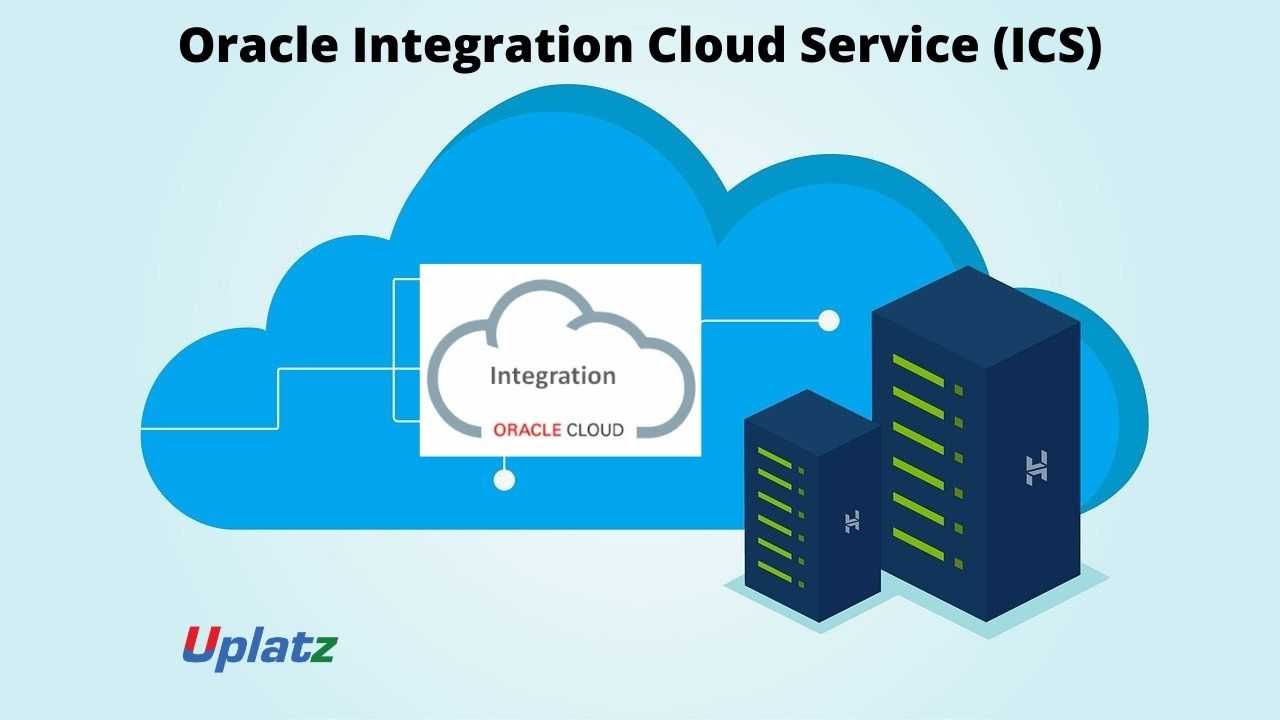Oracle Fusion Cloud ERP – Implementation & Administration
Master Financials, Procurement, and Project Management with End-to-End Cloud ERP Expertise Price Match Guarantee
Full Lifetime Access
Access on any Device
Technical Support
Secure Checkout
Course Completion Certificate
Price Match Guarantee
Full Lifetime Access
Access on any Device
Technical Support
Secure Checkout
Course Completion Certificate
 97% Started a new career
BUY THIS COURSE (
97% Started a new career
BUY THIS COURSE (GBP 12 GBP 29 )-
 84% Got a pay increase and promotion
84% Got a pay increase and promotion
Students also bought -
-

- Oracle Cloud Infrastructure (OCI)
- 10 Hours
- GBP 12
- 10 Learners
-

- Oracle ICS (Integration Cloud Service)
- 20 Hours
- GBP 12
- 58 Learners
-

- Oracle APEX
- 5 Hours
- GBP 12
- 469 Learners

Oracle Fusion Cloud ERP (Enterprise Resource Planning) is Oracle’s unified suite of intelligent, cloud-based business applications that automate, optimise, and connect every core function of an organisation — from finance and procurement to projects and compliance. It empowers businesses with a modern digital foundation, enabling them to improve productivity, strengthen internal controls, and gain actionable insights through real-time analytics and integrated workflows.
Built on Oracle Cloud Infrastructure (OCI), Fusion ERP combines cutting-edge technologies such as AI, machine learning, and predictive analytics to streamline decision-making and enhance operational efficiency. It delivers flexibility and scalability to support both growing startups and large global enterprises — transforming complex business processes into seamless, automated experiences.
The Oracle Fusion Cloud ERP – Complete Online Course by Uplatz provides an end-to-end learning journey combining conceptual clarity with hands-on configuration practice. You’ll gain functional and technical mastery of core ERP modules — including Financials, Procurement, Payables, Receivables, General Ledger, Expense Management, and Project Portfolio Management (PPM) — while learning how to customise, integrate, and maintain them in real-world enterprise environments.
By blending business understanding with technical skills, this course equips you to implement and manage Oracle ERP solutions confidently — making you career-ready for consulting, implementation, and enterprise management roles.
🔍 What is Oracle Fusion Cloud ERP?
Oracle Fusion Cloud ERP is a next-generation, cloud-native enterprise management solution that integrates all core business functions into a single intelligent platform. Unlike traditional on-premises ERP systems, Fusion ERP is continuously updated, scalable, and accessible globally. It delivers unified visibility across departments, allowing organisations to optimise processes, improve compliance, and make faster, data-driven decisions.
With its modular and service-oriented design, Fusion ERP covers all critical enterprise domains:
-
Financial Management: Automates accounting, payables, receivables, general ledger, fixed assets, and cash management.
-
Procurement: Simplifies supplier onboarding, purchase order management, and sourcing.
-
Project Portfolio Management (PPM): Tracks project costs, budgets, billing, and resource allocation.
-
Expense Management: Streamlines employee expense reporting and reimbursement workflows.
-
Risk & Compliance: Enforces audit trails, segregation of duties (SoD), and approval hierarchies.
-
Analytics & Reporting: Uses Oracle Transactional Business Intelligence (OTBI) and BI Publisher for real-time, customisable reports.
By leveraging machine learning and embedded analytics, Fusion ERP continuously learns from business data — improving forecasts, automating approvals, and recommending corrective actions. This intelligent automation helps enterprises achieve greater accuracy, agility, and control over their operations.
⚙️ How Oracle Fusion Cloud ERP Works
Oracle Fusion Cloud ERP functions as a centralised, intelligent ecosystem that unites all enterprise data and processes into a single digital core. It integrates seamlessly with HCM, SCM, and CRM modules, enabling a holistic view of business performance and efficient cross-departmental collaboration.
Core Architectural Principles:
-
Unified Data Model:
All transactional data from finance, procurement, and projects is stored centrally, ensuring accuracy and consistency. -
Role-Based Access & Security:
Permissions are defined through Identity and Access Management (IAM), enforcing compliance and data protection. -
End-to-End Automation:
From purchase requisition to payment, workflows are automated to eliminate manual effort and delays. -
Analytics & Dashboards:
Embedded OTBI and BI Publisher tools provide real-time insights, predictive analysis, and KPI dashboards. -
Integration & Extensibility:
Native REST APIs and Oracle Integration Cloud (OIC) enable easy connectivity with external systems. -
Continuous Innovation:
Quarterly Oracle updates deliver new features, process optimisations, and security enhancements automatically.
Through this architecture, Oracle Fusion Cloud ERP delivers a single source of truth for all enterprise data, helping decision-makers maintain financial accuracy, regulatory compliance, and operational efficiency.
🏭 How Oracle Fusion Cloud ERP is Used in the Industry
Oracle Fusion Cloud ERP is trusted by global enterprises across industries to drive efficiency, transparency, and growth. Its adaptability makes it ideal for organisations ranging from financial institutions and manufacturers to universities and government agencies.
Industry Use Cases:
-
Finance & Banking: Automating financial closing, reconciliations, and real-time reporting.
-
Manufacturing: Streamlining procurement, supply management, and cost tracking.
-
Healthcare: Managing procurement, compliance, and patient-related financial workflows.
-
Retail & E-Commerce: Tracking expenses, managing suppliers, and improving margin analysis.
-
Education & Government: Enabling budget transparency and audit-ready compliance.
Companies such as HSBC, Deloitte, Vodafone, FedEx, and Accenture rely on Oracle Fusion ERP to achieve greater efficiency, maintain global compliance, and standardise operations across multiple business units.
🌟 Benefits of Learning Oracle Fusion Cloud ERP
Mastering Oracle Fusion ERP equips professionals with one of the most in-demand skillsets in the enterprise technology landscape. The course offers both strategic understanding and technical proficiency — empowering learners to participate in or lead ERP implementations confidently.
Key Benefits:
-
Comprehensive ERP Mastery: Gain deep functional and technical knowledge across financials, procurement, and PPM.
-
High-Demand Career Path: Qualify for roles such as Oracle ERP Consultant, Functional Analyst, ERP Project Manager, or Business Systems Specialist.
-
Hands-On Implementation Skills: Learn how to configure and customise modules in a simulated environment.
-
Cross-Functional Understanding: Discover how different business areas connect within a unified ERP ecosystem.
-
Certification Preparation: Aligns with Oracle Fusion Cloud ERP certification exams, ensuring job readiness.
-
Industry Relevance: Learn workflows and setups applicable to multinational organisations.
-
Future-Proof Expertise: Understand cloud-based ERP transformation — a key driver in digital business evolution.
By completing this course, you’ll be equipped to implement, optimise, and manage end-to-end ERP systems that enable digital agility and financial transparency.
📘 What You’ll Learn in This Course
This self-paced online course combines detailed theory, configuration tutorials, and implementation case studies.
You will learn how to:
-
Understand Oracle Fusion ERP architecture, cloud deployment, and integration landscape.
-
Configure Financials, Payables, Receivables, and General Ledger modules.
-
Set up Procurement workflows and supplier management structures.
-
Manage Project Portfolio Management (PPM), expense tracking, and resource allocation.
-
Build and customise reports using OTBI and BI Publisher.
-
Define security roles, approval hierarchies, and access controls.
-
Perform data migration, user provisioning, and system administration tasks.
-
Integrate ERP with HCM, SCM, and third-party systems using APIs or middleware.
-
Troubleshoot and maintain configurations post-deployment.
Each topic includes video tutorials, sandbox simulations, assignments, and real-world examples to reinforce learning and confidence in practical scenarios.
🧠 How to Use This Course Effectively
-
Start with Core Fundamentals: Understand ERP principles and Fusion architecture before configuring modules.
-
Engage in Hands-On Practice: Follow guided exercises in a demo environment for each functional area.
-
Document Key Configurations: Keep detailed notes on workflows, security roles, and reporting structures.
-
Focus on Reporting: Spend extra time mastering OTBI and BI Publisher for analytics and dashboards.
-
Explore Integrations: Learn how ERP connects with HCM and SCM to form a full enterprise solution.
-
Apply to Capstone Project: Implement a complete ERP process flow to simulate an end-to-end enterprise deployment.
-
Prepare for Certification: Review Oracle documentation and practice assessments aligned with exam objectives.
👩💻 Who Should Take This Course
This course is ideal for professionals and students aiming to build or advance their careers in ERP, consulting, or enterprise transformation.
Suitable For:
-
Oracle Functional & Technical Consultants
-
Finance & Procurement Professionals transitioning to ERP roles
-
Business Analysts & Project Managers involved in system implementation
-
System Administrators & Developers managing cloud-based systems
-
Students & Graduates pursuing Oracle certifications or ERP careers
-
Enterprises & Teams migrating from on-premises ERP to Oracle Fusion Cloud
No prior Oracle ERP experience is required — all modules are explained step-by-step from fundamentals to advanced configuration.
🧩 Course Format and Certification
This self-paced program provides lifetime access with continuous updates aligned to Oracle’s latest quarterly releases.
You’ll receive:
-
HD video tutorials and live configuration demos
-
Downloadable templates, workflow diagrams, and setup checklists
-
Assignments and quizzes after each module
-
Capstone project simulating a live ERP implementation
-
Instructor and peer support through discussion forums
Upon completion, you’ll earn a Course Completion Certificate from Uplatz, validating your ability to configure, deploy, and maintain Oracle Fusion Cloud ERP in enterprise environments.
🚀 Why This Course Stands Out
-
End-to-End Learning: Covers functional, technical, and integration aspects in one course.
-
Hands-On Focus: Includes live configuration labs and sandbox simulations.
-
Industry Alignment: Follows real Oracle implementation frameworks.
-
Career-Oriented Approach: Prepares you for both certification exams and consulting roles.
-
Practical Portfolio: Build a capstone project to showcase your ERP implementation skills.
By completing this course, you’ll gain both the confidence and competence to lead enterprise digital transformation projects using Oracle’s most advanced ERP platform.
🌐 Final Takeaway
In the era of digital transformation, enterprises need intelligent systems that unify data, automate operations, and scale effortlessly. Oracle Fusion Cloud ERP provides that unified foundation — combining automation, analytics, and adaptability for sustainable growth.
The Oracle Fusion Cloud ERP – Complete Online Course by Uplatz empowers you to design, configure, and manage cloud-based ERP solutions that streamline business processes, improve decision-making, and drive organisational excellence.
Start your learning journey today and become a certified Oracle Fusion Cloud ERP professional ready to shape the future of enterprise management and digital transformation.
By the end of this course, you will be able to:
-
Understand the architecture and key components of Oracle Fusion Cloud ERP.
-
Configure ERP modules such as Financials, Procurement, and Projects.
-
Manage users, roles, and data security through Fusion Administration.
-
Implement workflows and approval hierarchies.
-
Perform data migration and interface setups.
-
Generate and customize reports using OTBI and BI Publisher.
-
Integrate ERP with other Oracle Cloud modules.
-
Troubleshoot and monitor ERP operations.
-
Manage system updates, patches, and cloud releases.
-
Prepare for Oracle Certified Implementation Specialist exams.
Course Syllabus
Module 1: Introduction to Oracle Fusion Cloud ERP
Module 2: ERP Architecture and Navigation
Module 3: Financials – General Ledger, Payables, Receivables
Module 4: Procurement and Supplier Management
Module 5: Project Portfolio Management (PPM)
Module 6: Expense Management and Fixed Assets
Module 7: Security, Roles, and Data Access Management
Module 8: OTBI and BI Publisher Reporting
Module 9: ERP Integration with HCM, SCM, and Third-Party Systems
Module 10: Implementation Lifecycle and Administration Best Practices
Upon successful completion, learners will receive a Certificate of Completion from Uplatz, demonstrating proficiency in Oracle Fusion Cloud ERP – Implementation & Administration. This Uplatz certification validates your ability to configure, manage, and support enterprise-grade ERP systems, aligning with industry standards for Oracle practitioners.
It also prepares you for recognized Oracle certifications such as Oracle Fusion Cloud ERP Financials Implementation Professional (1Z0-1054) and Oracle Procurement Cloud Certification. With this certificate, professionals can confidently apply for roles involving ERP implementation, configuration, reporting, and system administration. It serves as a strong credential to showcase your ERP expertise on your resume or LinkedIn profile.
The demand for Oracle Fusion ERP professionals is rapidly growing as global enterprises migrate from on-premise to cloud-based ERP solutions. Completing this course from Uplatz equips you for key roles such as:
-
Oracle ERP Functional Consultant
-
Oracle Fusion ERP Administrator
-
ERP Implementation Specialist
-
Procurement or Financials Consultant
-
ERP Support Analyst
Professionals skilled in Oracle ERP command high salaries, with roles typically ranging from $90,000 to $170,000 per year, depending on specialization and experience.
Career growth opportunities include working in ERP consulting firms, Oracle partner organizations, multinational corporations, and government IT projects. Additionally, the skills gained in reporting and integration open doors to roles in data analytics, business intelligence, and digital transformation consulting.
With hands-on knowledge from this course, you can confidently lead or support ERP implementations across diverse industries such as finance, manufacturing, healthcare, and public services.
-
What is Oracle Fusion Cloud ERP?
It is a suite of integrated applications that automates business processes like finance, procurement, and project management on Oracle Cloud. -
How is Fusion ERP different from Oracle E-Business Suite (EBS)?
Fusion ERP is cloud-native with automatic updates, better scalability, and reduced maintenance, unlike the on-premise EBS. -
What are the main modules in Fusion ERP?
Financials, Procurement, Payables, Receivables, Projects, and Expenses. -
What is OTBI used for?
Oracle Transactional Business Intelligence (OTBI) is used for real-time analytics and report generation using live transactional data. -
What is BI Publisher?
A reporting tool that allows users to design, format, and distribute enterprise reports with data extracted from Oracle ERP. -
How do you manage user access in Fusion ERP?
Through role-based access control (RBAC) and security privileges defined in the Identity and Access Management setup. -
What is the role of Approval Workflows in ERP?
They automate approval processes for tasks like purchase requisitions or expense reports. -
How is data migration handled during ERP implementation?
Using tools like FBDI (File-Based Data Import) to load bulk data into Fusion modules. -
How do integrations work in Oracle Fusion Cloud ERP?
Via REST APIs, SOAP services, or middleware like Oracle Integration Cloud (OIC). -
What are the benefits of implementing Oracle ERP?
Improved efficiency, centralized data management, real-time visibility, and reduced operational costs.









